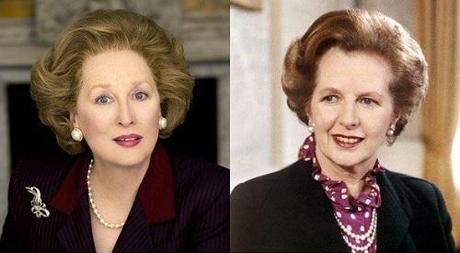
Meryl Streep and Margaret Thatcher
Being the avid history nerd that I am, I was basically counting down the minutes until the opening of Iron Lady, the new film chronicling Margaret Thatcher’s life, starring Meryl Streep. I mean, what could be better than Meryl Streep (who is awesomeness in human form) taking on a complex, fascinating character like Prime Minister Thatcher, right? Regardless of your politics, Margaret Thatcher’s story is an exciting one.
I was expecting a few things from the film. First, I was expecting a kick-butt performance from Ms. Streep. Second, I was expecting to learn more about Margaret Thatcher’s political and personal story, since I don’t know that much about her. Third, I was expecting to be thoroughly entertained.
Unfortunately, only one of my three expectations was really fulfilled. Meryl Streep’s performance was above and beyond what I had hoped for. She did an incredible job conveying subtle aspects of Margaret Thatcher’s character, and portraying her throughout at different ages. I also just have to give props to Meryl Streep for taking on this role and helping to bring to light the story of a political trailblazer.
Sadly, I feel the film didn’t give Meryl Streep much of a chance to delve into certain aspects of Thatcher’s character. The film touched on events that occurred during Thatcher’s time as Prime Minister, but glossed over many.
I wanted to see more explanation of how Thatcher came to believe in her conservative politics, whether she ever questioned them, and how she became interested in politics in the first place.The film alludes to Thatcher’s early ambitions with a scene where she dreamily watches her politically active father deliver a speech, but skips over Thatcher’s time at Oxford, showing us her run for Parliament before we know why or when she became interested in politics.
Instead the film focuses mainly on Thatcher’s life as an old woman, after her husband has died, as she is beginning to lose her mind. In most of the movie, Thatcher is coping with the loss of her husband. She hallucinates that he is with her when he is, in fact, dead, and for most of the film refuses to throw out his belongings.
At the end of the film, she finally lets her hallucinations go, as she imagines her husband walking out the door. However, this is done with much crying and saying that she is scared to be alone. I thought the film’s choice to include these hallucinations was especially interesting, as it highlighted Thatcher’s dependency on her male counterpart, rather than focusing on her independent strength.
One positive aspect of this portrayal is that it debunks the idea that Margaret Thatcher was, well, an Iron Lady. Showing Thatcher as vulnerable and reliant on her husband humanizes her to some extent. However, it frustrates me that it is necessary to portray a female leader as dependent on her husband to humanize her or make her seem likeable.
I found myself wishing that the film had focused on a stronger, more independent Thatcher, rather than trying to make her hard exterior soft on the edges.
Maybe it’s because I can be a bit of an iron lady myself sometimes, but I think Thatcher would have been even more likeable and relatable, had more of her firmness and independence been portrayed. I was expecting a lot from this film, and frankly, I left somewhat disappointed. While I commend Streep and the others who worked on this film for highlighting the life of such an interesting woman, I hope that someday filmmakers will not feel the need to soften such a powerful character simply because of her gender.

